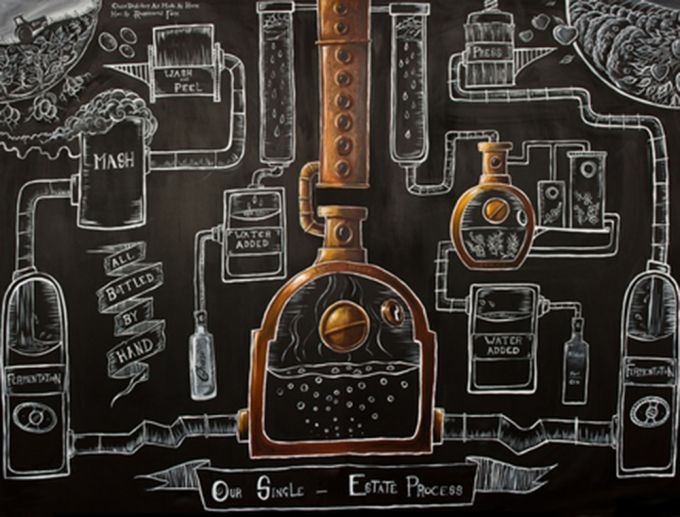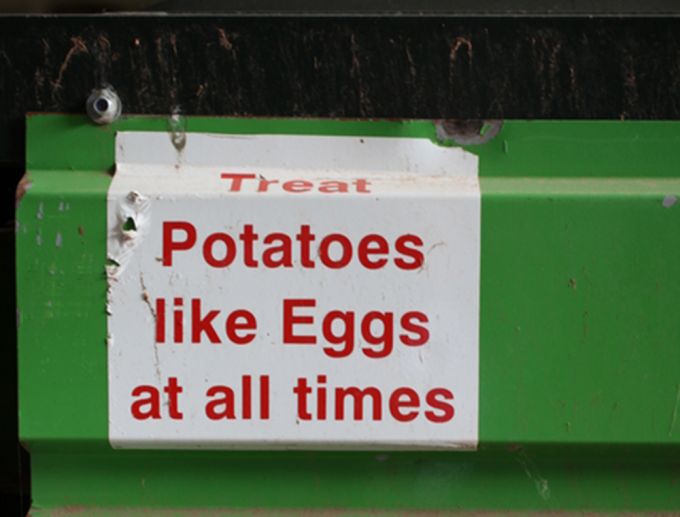Words by Jane Ryan
Photography by Supplied

Potato, potahto, rye, corn or wheat right? Well no, not quite. In fact, potatoes make a huge difference when used to make spirit rather than your typical grains – and using a potato-based gin or vodka in your Martini is going to impart a lot of mouthfeel and texture. Here’s how and why you should consider making the potato switch.
There’s vodka that tries hard to taste clean – see bottles with talk of multiple distillations and associations that only water brands try to make; mountains, purity and freshness. Then there’s vodka that tries to taste of something, ones made from rye or bison grass for example. Potato vodka, and gin, fall firmly into the later category and there is no mistaking one once you’ve tried it. When done well, a potato base spirit has a rich, thick, almost creamy texture that is unlike what you can get from any other grain.

The potato fields at Chase Distillery
With such a unique mouthfeel, potato spirits are not for those seeking a bland neutrality. Typically you’ll pick up, alongside the creamy palate, something vegetal akin to new potato skins and cracked black pepper – smooth and spicy all at once. That distinct vegetal notes also means potato-based spirits play well in savoury cocktails like a Martini , especially if you like an olive or pickled onion garnish.
How is Potato Vodka and Gin Made?

Chase Distillery's process laid out
Potatoes are typically harvested in late summer and stored in the pitch-black until they’re ready to be made into alcohol. Farming for vodka rather than eating potatoes is actually quite a green practice - all different sizes can be used for distilling, even those which are too small for retail sale or used for making into potato chips. In fact, the smaller the better as they are higher in starch than bigger potatoes which are swollen with water.
A brand like the UK’s Chase Distillery, one of the best versions of potato vodka and gin and of which Difford’s Guide has been long-term fans, uses varieties such as Lady Claire, Lady Rosetta and Maris Piper which have a high starch content, typically 25% compared to 17% for eating potatoes.
Chase is also one of the rare field to bottle operations when it comes to potato spirits. In fact they started out as potato farmers in the first place, and their farm in England's Herefordshire continues to this day to grow all the crops they turn into alcohol with over 300 acres of potatoes. It's an incredibly green operation - think creating all their energy from the farm's bio-boiler and all the potato waste either fertilisers the fields or feeds the cattle.

Image from Chase Distillery
It takes a lot more potatoes than you’d think to make alcohol. Any number you have in your head right now (no scrolling and cheating please) probably won’t come close to the weight needed to yield 1,000 litres of spirit – which we can reveal is... 16,000 kilos. So quite a lot then. Chase estimate there’s 250 potatoes in one bottle of their potato vodka.
The process goes something like this (link here if you want more detail); the potatoes are peeled, chopped and cooked by steam, which gelatinises the starch. Powdered enzymes are added which further help turn those starches into the sugars needed to start the fermentation process. Yeast is added and what starts as a runny mash potato slowly turns into a potato wine, if you will, around 8% abv.
This is then distilled (science of distillation linked here) to turn the low-alcohol potato ferment into a spirit at around 85%. But we’re not done yet. The spirit is then rectified, essentially being heated again into a vapour to separate out unwanted methanol and leaving a very high potato spirit that’s 96% alcohol. Cut down it produces a 40% vodka, or redistilled with juniper and other botanicals it makes a gin.

Harry Chase holds his prize crop
Making the Perfect Potato Vodka or Gin Martini
So now you know how potato spirits are made, here’s why the Martini is the drink to enjoy them in. We’ve gone on about mouthfeel and creaminess, but potato spirits also have weight to them, a density which makes the Martini, a drink of only two ingredients, work. You don’t have to take our word for it though, here’s what owner Takao Mori of Tokyo's iconic Mori Bar has said on the subject; “It has to be a sturdy, solid gin to work.”
POTATO VODKA MARTINIS

Let’s start with the Vodka Martini, made with Chase English Potato Vodka. This particular spirit has a creamy, dairy-like aroma with black pepper and a faint sweetness. This is more-or-less followed through on the palate, there’s that spice but also potato skins and gentle aniseed. The perfect Martini to craft from it is easy enough.
Classic Potato Vodka Martini
Glass: Martini or coupe
Garnish: Olive
How to make: STIR ingredients over ice for aprox 20 seconds. Strain into chilled glass.
60ml Chase English Potato vodka
10ml dry vermouth
Once you’ve mastered that, try this savoury twist from London bartenders Alex Kratena and Monica Berg which focuses on the savoury element and adds in some additional flavour. It’s small in size but bold to try and works incredibly well with a potato vodka.
One Sip Martini
Glass: Martini or coupe
Garnish: Cheese-stuffed olive
How to make: STIR ingredients over ice for aprox 20 seconds. Strain into chilled glass.
25ml Chase English Potato vodka
5ml dry vermouth
4 dash fino sherry
POTATO GIN MARTINIS

Potato gins are far rarer than potato vodkas, simply because most gin producers don’t make their own alcohol but buy in neutral grain spirit to flavour with botanicals. However, with their unique base spirit that already has incredible texture and spice from the pepper, the few that do exisit create a very flavourful gin and a masterful Martini.
Dry Potato Gin Martini
Glass: Martini or coupe
Garnish: Lemon zest (discard) and olive
How to make: STIR ingredients over ice for aprox 20 seconds. Strain into chilled glass and zest the lemon peel over the drink before discarding. Then add the olive.
60ml Chase GB Gin
10ml dry vermouth
Finally, why not have the best of both worlds, and try a Vesper which uses both gin and vodka and is somewhat scandalously shaken. A true James Bond icon.
Vesper Martini
Glass: Martini or coupe
Garnish: Lemon zest
How to make: SHAKE ingredients over ice and fine strain into chilled glass and zest the lemon peel over the drink.
60ml Chase GB Gin
20ml Chase English Potato vodka
5ml Lillet Blanc
5ml Kina aromatised wine





Join the Discussion
... comment(s) for Mastering the Potato-Based Martini
You must log in to your account to make a comment.